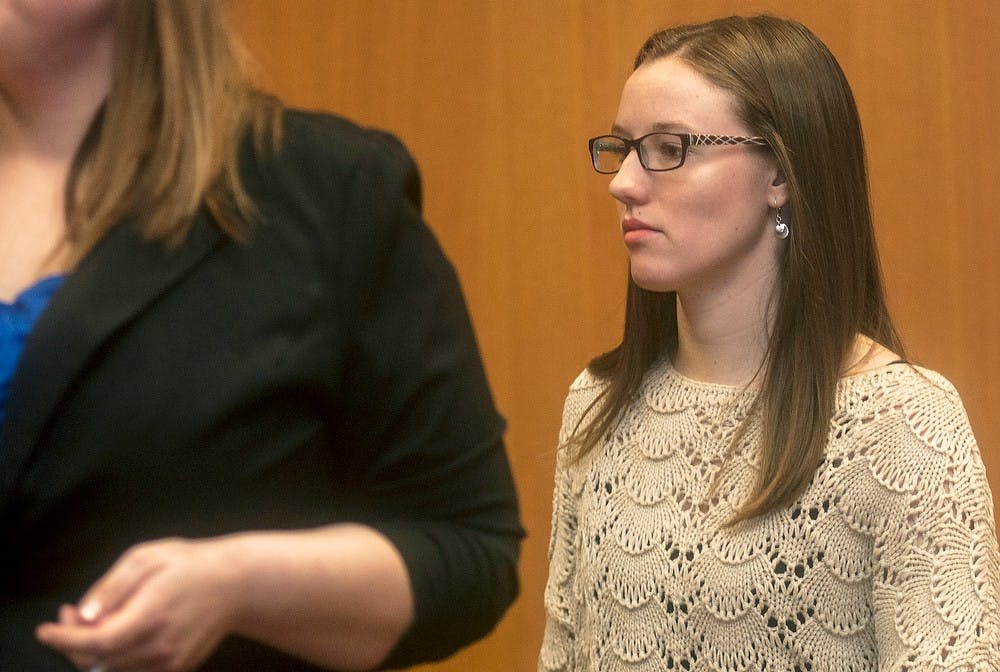For Spartan fans worldwide, December 2013 will be remembered as the time a 26-year drought was lifted as the Spartans marched into the Rose Bowl as outright Big Ten Champions.
Unfortunately for 27 people, many of whom were students, it was the early morning of Dec. 8 that likely will remain the most memorable.
Immediately following the win, thousands of students and East Lansing residents descended into the streets of the city. For some, this meant a celebration that has become a part of the East Lansing scenery following big wins and losses — couch fires.
The East Lansing Fire Department responded to 57 fires that night, according to police. DTN Management Co. Vice President Colin Cronin estimated that between $5,000 and $10,000 in damage was caused to Cedar Village.
Two months later, some of those arrested during post-game celebrations are seeing their day in court.
In custody
For some of the students arrested, the randomness in nature is what was most disturbing about the arrests.
One male student who was arrested, who asked to remain anonymous to protect his identity, said he was grabbed just moments after chatting with another police officer.
“I was standing still, talking to my father after the Big Ten Championship game that had just been concluded,” he said. “I had been holding a jovial conversation with a police officer less than three minutes prior and 15 feet from the arresting site. Two officers approached me, cuffed me, insinuated that I had started the fire and took me to jail overnight.”
The student said he felt the experience was meant to make an example out of him.
“I feel that I, among others, was arrested under the ordinance in order to be made an example of, rather than to quell any instance of my wrongdoing,” he said. “They couldn’t get those who started the fire, so they took whoever they could.”
Most of the charges were for violating a city ordinance stating no one can remain within 300 feet of an open fire without the intent to extinguish it. Violations can result in a maximum of a 90-day jail sentence and a $500 fine. The maximum punishment for the crime also could mean suspension from the university for one year.
Although alcohol was not a factor in all cases, some underage suspects face minor in possession of alcohol charges on top of their violation of the ordinance.
In the courtroom
The problems did not end for the people arrested that night, as many of them were scheduled to be back in court Monday in 54-B District Court, such as music education senior Maura McGlynn. McGlynn was the only one to testify Monday as other cases were rescheduled to a later date.
McGlynn signed a plea agreement that convicted her of a lesser charge of a littering civil infraction. She testified in court that she was standing in a friend’s yard at the time of her arrest.
“I wouldn’t call the fire big, it was more medium sized,” she said, describing her surroundings.
She testified she stayed near the fire for about 20 minutes.
Leading up to Monday’s proceedings, McGlynn was required to call and see if she needed to take a blood alcohol test.
Her sentencing was defered for six months. She declined to comment on her arrest.
Support student media!
Please consider donating to The State News and help fund the future of journalism.
Many of the students arrested on Dec. 8 either did not respond to requests for comment or declined comment at the advice of their legal counsel.
Paying up
Following the arrests, East Lansing police continued to look for more information. The department set up a reward fund for tips and information leading to the arrests of anyone else involved in the civil disturbance.
East Lansing police Capt. Jeff Murphy said the fund has not been used much, as only $2,000 of the $20,000 has been used.
“Right now, we have not had a tip in quite a while,” he said. “It appears to be old news, but if a good tip comes in we will work it like any other crime.”
Murphy said the police department put forward $10,000 of their money for the fund. MSU responded in the days after the incident by matching the $10,000 donation to the fund put forward by the East Lansing police.
The tip system worked by rewarding good information with a $500 reward per informant. Murphy said the police department would try to get that money back as part of plea agreements and sentences at the expense of the defendant.
“If the tip came in, and it was good, we would pay $500 out of the budget for the tipster,” he said. “If the tip came back and was good, what we would ask for is the defendant to pay back the money.”
Changing the culture
The legal process for those arrested in December is just beginning. Media and information sophomore Izak Gracy will go to trial on Feb. 20, according to court records. He is fighting the charges against him.
In the aftermath of what police and East Lansing city officials are calling a “civil disturbance,” Police Chief Juli Liebler said she wants to change the culture in East Lansing and at MSU by not glorifying the term riot.
“That (riot) is a very inflammatory term,” she said to The State News after the Dec. 10 East Lansing City Council meeting.“We’re trying to change the culture at this university and the use of that word is inflammatory.”
Discussion
Share and discuss “Facing the consequences” on social media.







